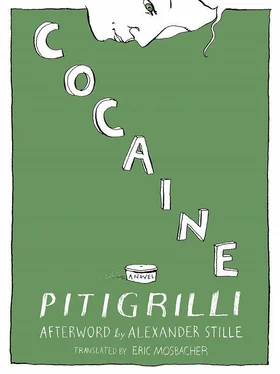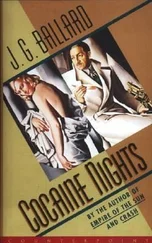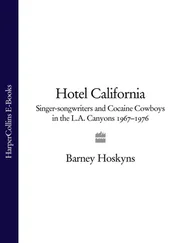“I’m the first clarinet in the prize-winning Musica in Testa band, and I can offer you very favorable terms,” the man said. “We have a select repertoire of funeral marches: Gounod, Donizetti, Wagner, Petrella, Grieg and Chopin. We have a worn banner, it’s so worn that you can’t read what’s written on it; it looks like the banner of a charity of which the deceased was a patron and benefactor. Every player has his own special headgear, and for a small supplement he will also wear a sword.”
“What does it come to with the sword?”
“Two hundred lire.”
“Very well, then. I’ll see you tomorrow.”
“What about the pieces?”
“What pieces?”
“The pieces of music.”
“You choose them. The best you have in stock.”
Some men arrived with the coffin.
Nocera took out Tito’s green silk pajamas, and the men helped him to put them on the dead man.
Then they put him in the coffin.
“Shall we close it straight away?”
“Yes, unless there’s anything else to put in.”
The hearse was waiting outside the door. The undertaker’s assistants carried down the coffin and put it in the hearse with neatness and precision, and the procession set off. The balconies were full of curious onlookers, and women shopkeepers came to the shop doors and gossiped.
The procession was led by an undertaker’s assistant with moustaches trimmed in the American style.
He was followed by the band, which consisted of
A piccolo,
eight flutes,
two cornets,
two trombones,
percussion group and triangle,
two baritone saxhorns,
and one bass.
Next came the nuns dressed in green.
They looked like a walking salad.
Then came the priests, singing psalms. There were eight of them, but one was lame.
The hearse was very solemn and was adorned with chrysanthemums as soft as ostrich feathers. The horses were in full canonicals.
Then came Maud, in a black veil.
Nocera.
Maud’s father, wearing an overcoat belonging to the dead man. It was a perfect fit.
Then came many women and many men. People Nocera had never seen before.
A number of old women made the sign of the cross when the hearse went by.
A boy on a bicycle rode beside the band with one thigh on the saddle and both legs on the same side, pedaling with one foot only.
Two dogs who were closely examining each other went on doing so.
“It’s the dead man’s sister,” one of the mourners said, referring to Maud.
“His wife.”
“His mistress.”
“Quite good to look at.”
“She has a lovely…”
“And two lovely…”
“She’s old.”
“I don’t think so. About thirty-five.”
“She’s older than that.”
“What does she do?”
“She’s a…”
“Yes, she always has been.”
“And he?”
“He shut one eye.”
“And opened his purse.”
“But he did it with style.”
“Everyone knew about it.”
“Also he’d been in prison.”
“Forged promissory notes.”
“And what did he die of?”
“TB.”
“Syphilis.”
“Really?”
“And a pretty good dose too.”
“The American kind.”
“No doubt he gave it to her.”
“It was she who gave it to him.”
“Really?”
“Everyone knows it.”
“I know the doctor who treated both of them.”
“A fine state of affairs.”
The band, the nuns, the priests, the hearse, the whole procession had stopped. The undertaker’s assistants took the coffin and carried it into the church; then they brought it out again and then took it in again.
The procession set off once more.
Slowly, slowly.
Too slowly.
Funerals ought to be motorized. The deceased should be in a car and the procession on motorcycles. The nuns should be on motorcycles, the band should be on motorcycles, and the relatives, inconsolable at the premature loss, should be on motorcycles too.
Nocera looked back. There were fewer people now, but there were still a great many.
Poor devils who never had a loan of two lire or a word of comfort in the whole of their lives are escorted to the cemetery by a crowd of solicitous people. The most ignorant elementary school teacher is given a funeral oration by the director of education; the lawyer at the local magistrates’ court is given his last farewell by the president of the high court; and the poorest village doctor is mourned as if he were a real loss to science; the solitary individual always to be seen sitting by himself and reading the newspaper on a park bench is accompanied to his “last resting place” by several hundred intimate friends “in sad and orderly procession.”
A living man may still spring surprises on you. He may round on you, harm you, let you down, change his mind and alter his will. But when he’s dead, it’s final, and you know where you are.
A coffin is always followed by the dead man’s close enemies: the husband by his wife’s lover, the man killed in a duel by his opponent, the debtor by his creditors.
The passers-by raised their hats and the procession went on.
“It’s her I’m sorry for.”
“She’ll get over it.”
“Not immediately.”
“As soon as she finds someone else.”
“She’ll already have someone lined up.”
“More than one.”
“Men will go after anything.”
“Women of that sort.”
“With that painted face.”
“And those false teeth.”
“And that wig.”
“And her profession.”
“What’s that?”
“She works for men.”
They were near the cemetery. The white chimney of the crematorium came into view.
They went through various gates and made towards it.
Stop.
Out with the coffin. Silence. Speech by a gentleman whom no one had ever seen before.
Did anyone else wish to speak?
No one did.
Two attendants took the coffin into a white room and put it on a trolley, which moved away.
An official of the cremation society announced that the next of kin could watch. Maud stayed in the chapel to pray, and Nocera took up a position behind the big lens, through which he would be able to see his friend’s body devoured by the flames.
“It’ll take an hour,” the official said.
Nocera gave him twenty lire. “See that’s he’s well done.”
“Leave it to me.”
Nocera could see nothing. Suddenly the body came in, naked. No flames surrounded it, but it moved, contracted, writhed.
So it’s true, Nocera said to himself with his face to the lens, so it’s true that it rises, kneels, contracts, curls up, assumes obscene attitudes. Tito was right. A pity he’s not here to see, because he’d be amused. He puts his hand to his brow as in a military salute. He presses his fists to his eyes, like a fetus. Is it a return to the womb?
The body changed color, shriveled, blackened, was consumed, carbonized, turned to ashes.
When it was over, they withdrew the trolley and gathered the ashes with a silver trowel.
Nocera had brought the two shining spherical urns, and he filled both. Some fragments of bone were put in a regulation red clay urn and put in a wall in which there were many small memorial tablets.
He put one urn in one pocket and one in the other and offered his arm to Maud. Everyone else had slipped away.
“And where shall we go now?” Nocera asked her as he helped her into a cab that was waiting outside the cemetery.
“I’ve got to go to the dressmaker’s to order my mourning.”
“Black will suit you very well.”
“I hope so. But not dull black. Shiny black suits me. I’ll order shiny black, so it won’t look so much like mourning.” No one had told the cabman where to go, but he was driving back towards the city.
Читать дальше



